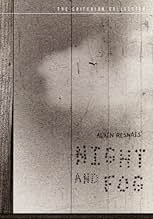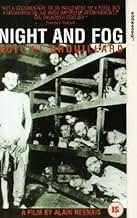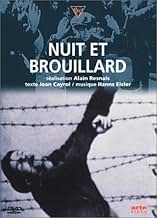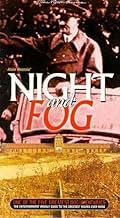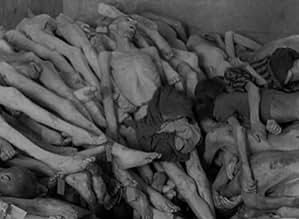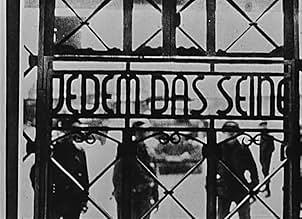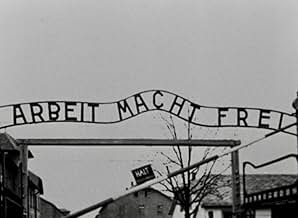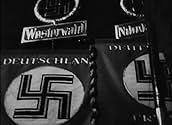I campi di concentramento dei Nazisti e l'infernale mondo della disumanizzazione e la morte contenuta al suo interno.I campi di concentramento dei Nazisti e l'infernale mondo della disumanizzazione e la morte contenuta al suo interno.I campi di concentramento dei Nazisti e l'infernale mondo della disumanizzazione e la morte contenuta al suo interno.
- Nominato ai 1 BAFTA Award
- 2 vittorie e 1 candidatura in totale
- Narrator
- (voce)
- (non citato nei titoli originali)
- Self
- (filmato d'archivio)
- (non citato nei titoli originali)
- Self
- (filmato d'archivio)
- (non citato nei titoli originali)
- Self
- (filmato d'archivio)
- (non citato nei titoli originali)
- Self
- (filmato d'archivio)
- (non citato nei titoli originali)
Recensioni in evidenza
Another purpose is to show the ultimate failure of the Nazis at Nuremburg to take responsibility for it. It would have been welcome to also depict the complicity of others: big business, the other victims of the Nazi's, similar atrocities such as the My Lai massacre, ethnic cleansing, genocide, state violence and so forth but this was not possible given the length of the film and its purpose. Today, when there is so much holocaust denial, people need to be reminded not that the Nazis were demons but of the consequences of unchecked state power without an ethical base.
The film opens in 1955 with an image of a barren field of grass with lush romantic music in the background. The scene then abruptly shifts to wartime. We are in Auschwitz and the prisoners are arriving. We are shown scenes shot after liberation that are so shocking that they have never been made public outside of this film. Resnais does not spare us: the hair shaved off the heads of women piled high on the floor, bodies -- men -women - children -- are tossed in a garbage pit like so much rubbish, their fat used to make soap. The film only lasts a short time, but the images remain indelible. Unwillingness to acknowledge responsibility is depicted in brief scenes of the Nuremberg Trials. As we witness the conscious distortion of the past still going on today, we are left numb.
This movie is probably the best holocaust documentary ever made. The images of piles of human hair, emaciated skeletons being pushed around by bulldozers, lampshades of human skin, men looking like corpses walking around, has never left me. The opera and classical music in the background helps to further add to the shock value of this film.
After about 10 minutes, kids in my class told my teacher we didn't want to watch this movie anymore. We stopped it and there was still 30 minutes left in class. We didn't learn anything about economics that day, we talked about the holocaust instead.
I came about this film by accident. I am an English teacher, and currently my students are reading Elie Wiesel's Nobel Prize winning memoir, "Night." Looking for a visual connection to the piece, I came across "Night and Fog." At 31 minutes, it appeared the perfect video complement to that devastating book. After watching the film in my dark, empty classroom, I realized the film offered so much more.
In a culture where violence and images of death are glamorized, "Night and Fog" serves a unique purpose. It cuts through the desensitized soul and puts us face-to-face with true, unadulterated evil. While many might suggest this is overkill, occasionally we need to do this if only to remind ourselves of man's potential to perpetrate the abominations this film so cruelly unveils. We need to force ourselves to confront such forces, if only to ensure the film's prophetic final lines do not become a reality. "Who is on the lookout...to warn us of the coming of new executioners? Are their faces really different from our own?"
This is the question which consumed me as I stared seemingly forever at the wall after the film ended. This is the question I want my students to ask. After much deliberation, I decided to show it, not as a history lesson, but as a moral lesson in the nature of evil. Great films get a strong reaction. Resnais' film is one of the greats.
Lo sapevi?
- QuizIn the DVD re-release, there is a subtle but controversial difference in one of the still photographs of a Nazi concentration camp in southern France. In this version the distinctive profile of a French gendarme can be seen at one of the camps, implying that the French Vichy government of the time was aware of and perhaps involved in the management of the camps. This same photograph appears in the original version but the gendarme's profile was obscured at the insistence of the French government (who commissioned the film) when the film was in post-production.
- BlooperIn the film a popular myth about the Third Reich is presented as fact: The claim that the body fat of prisoners in extermination camps was used to produce soap. Though evidence does exist of small-scale soap production, possibly experimental, in the camp at Stutthof concentration camp near Danzig/Gdansk, mainstream scholars of the Holocaust consider the idea that the Nazis manufactured soap on an industrial scale to be part of World War II folklore.
- Citazioni
Récitant/Narrator: With our sincere gaze we survey these ruins, as if the old monster lay crushed forever beneath the rubble. We pretend to take up hope again as the image recedes into the past, as if we were cured once and for all of the scourge of the camps. We pretend it happened all at once, at a given time and place. We turn a blind eye to what surrounds us and a deaf ear to humanity's never-ending cry.
- Versioni alternativeBefore its original release, there was a still of a French gendarme (policeman) watching a roundup at Pithiviers. He is easily recognizable by the characteristic French "kepi." Wanting to deny complicity, French censors insisted this shot not be allowed, so for its original release, the image was altered so that a wooden beam covered the gendarme and his kepi. In 1997 or 98, the original version of the film was re-released in France, finally revealing the gendarme. The original American release of the film did not translate all the dialogue for the subtitles, in particular leaving out one of the two references to Jews: "Annette, from Bordeaux." Subsequent releases restored the original text: "Annette, a Jew from Bordeaux."
- ConnessioniEdited from I campi di concentramento nazisti (1945)
I più visti
Dettagli
- Tempo di esecuzione32 minuti
- Colore
- Mix di suoni
- Proporzioni
- 1.37 : 1
Contribuisci a questa pagina


